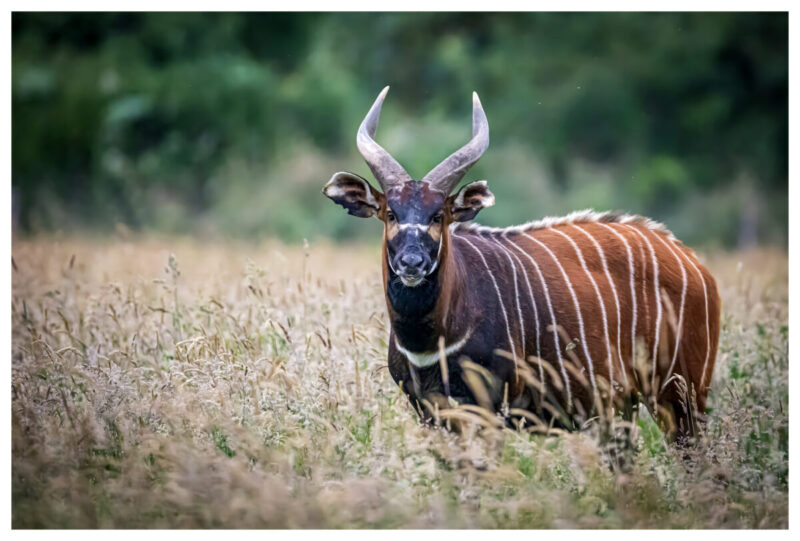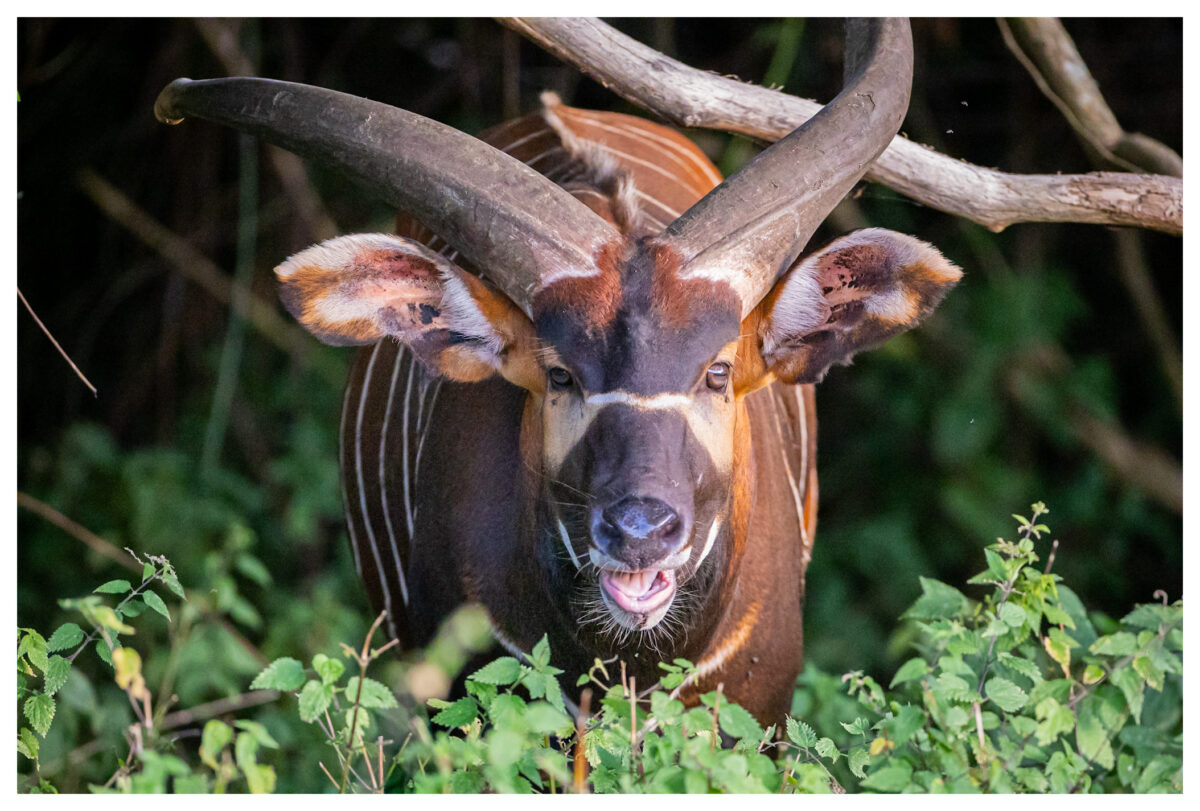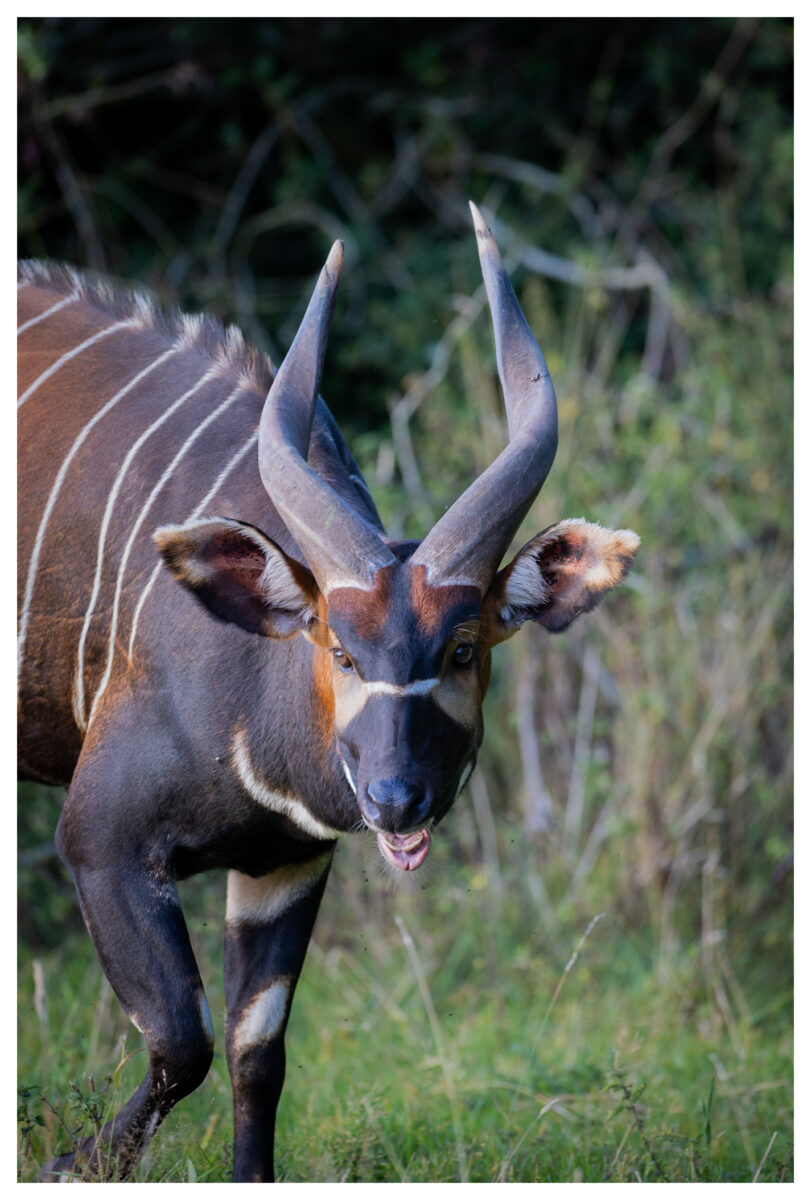Europe’s Only Zoo with a Bachelor Bongo Group

Watatunga Wildlife Reserve is currently the only zoo in Europe to house a bachelor Bongo group consisting of 3 entire males that are still capable of breeding!
Meet our 2 new Eastern Mountain Bongo bulls, Arusi and Mwisho. There are less than 100 Eastern Mountain Bongo left in the wild and having these two is very exciting as hopefully one day the European captive population can contribute towards re-release prospects.
Meet Europe’s Only Bachelor Bongo Group
We are mixing our Eastern Mountain Bull Mtoto with 2 new bulls, making Watatunga Wildlife Reserve the only zoo in Europe to currently house a bachelor Bongo group consisting of males that are still capable of breeding. Our current bongo bull Mtoto is almost 5, Mwisho is nearly 4 and Arusi is 3. Mwisho and Arusi have known each other since birth but came to us via the European Endangered Species Programme (EEP) as they were beginning to agitate each other in their previous home.
The European Association of Zoos and Aquaria (EAZA) Ex-situ Programme (EEP) is a conservation and population management program for wild animals in European zoos and aquariums. Their goal is to ensure that endangered species have a healthy backup population in zoos. This also includes maintaining a sustainable captive population of key species and managing healthy and genetically diverse animal populations.
As with all our new animals Mwisho and Arusi were housed in a soft release area to acclimatise to their new home for several weeks before being released into our main reserve to freely roam. We are delighted to say that they are positively interacting with Mtoto and the rest of our animal species.

What is the importance of this?
Today we know that there are less than 100 Eastern Mountain Bongo individuals left in the wild. They are classified as Critically Endangered on the IUCN Red List. There are 415 Bongo in captivity across the world, 112 in Europe & just 29 individuals within the UK. At present, we are the only collection within Europe housing entire bulls together to form a bachelor group, which is considerably important to the EEP.
There are real potential re-release prospects for bongo being released back into the wild within the near future – The Mount Kenya Conservancy Trust has, in collaboration with the Kenya Wildlife Service (KWS) and Kenya Forest Service (KFS), established the world’s first Mountain Bongo Sanctuary: The Mawingu Mountain Bongo Sanctuary. This 776 acre pristine forest Sanctuary is located at the foothills of Mount Kenya, a well known former range of the Mountain Bongo and is contiguous with Mount Kenya National Park. This rich habitat provides a more extensive area to continue rewilding the Mountain Bongo in preparation for survival in the wild. Hopefully one day the European captive population can contribute towards the Bongo population that occupies this Bongo Sanctuary. For more information on the Mount Kenya Wildlife Conservancy see here: https://mountkenyawildlifeconservancy.org/bongo-restoration
Why Watatunga Wildlife Reserve is the ideal place for this to happen?
Watatunga is 170 acres, it is also comprised of very complex and diverse habitat ranges. From wetlands, open savannah grasslands, marshland, dense woodland, shrubland, and lake land areas. Not only does this complex habitat provide lots of visual barriers for the bulls, but it also allows them to explore and occupy different areas of the reserve. If you have 2 bulls in a small area being forced to share a house, and being fed together, there is a higher risk of conflict. However, here at Watatunga Wildlife Reserve they aren’t being forced to share anything. We have 6 heated sheds on the reserve that they can occupy during the winter months, we feed them separately and always leave ample room between them when feeding concentrates.
We are lucky in that we are able to take the Bongo off concentrated feed for 6 months or more of the year depending on the weather, as we have lush vegetation and browse species within the reserve. In the winter we supplement the lack of grass and leaves with haylage, but in the spring and summer we try not to supplement their diet at all. We have over 12 different species of browse (tree leaves) that the Bongo can eat within Watatunga. Bongo are selective browsers – meaning this is incredibly important to their diet and feeding regime. Exotic ruminants are delicate creatures and can be incredibly hard to manage from a nutritional point of view in captivity as they are subject to multiple dietary disorders; with the most prolific being rumen acidosis. Rumen acidosis occurs when the gut is too acidic, more often than not caused by feeding too many concentrates to one specific animal within any given time frame, meaning their gut simply cannot cope and turns acidic. When the gut turns acidic, it is unable to absorb nutrients effectively and has a catastrophic domino effect on that individual. We avoid this at Watatunga by offsetting feeding higher concentrates in the winter, by removing all concentrates in the summer, allowing their gut to return to its natural rumen pH, which should be between 6 & 7. We hope to show this is a successful technique by carrying out a variety of different studies in the near future with research students. Keep an eye out for these opportunities students!
What this means for the future conservation of the Eastern Mountain Bongo
Watatunga Wildlife Reserve hopes to provide important support to the captive breeding programme (EEP) by holding surplus breeding males that are not needed at present but may be needed one day. Organising the transfer of our newest bongo boys was a lot of work for both us and Howlett’s Wildlife Park – this is where our two new bongos came from. It was incredibly difficult due to Blue Tongue disease now being present in the UK after 16 years, we had to obtain a special permit that only allowed us to move them within a 48 hour window under specific sanctions and parameters. It was stressful for all involved, keepers, registrars, vets and us managers!
Since Brexit European transfers have been incredibly difficult and confusing for zoos all across Europe. UK populations are now being managed separately within some captive breeding programmes due it being too difficult to transfer animals from the UK to other countries, meaning that holding surplus bulls is more important now than ever for the captive breeding programme. If we prove that we can keep a bachelor herd of entire males successfully, maybe more collections will try it. It’s been done in America quite a lot but to our knowledge, it hasn’t yet been done in the European population with entire bulls, only castrated males mixed with a single bull. It gives the breeding programme much more flexibility and may even allow them to rotate around breeding males in future.
Watatunga Wildlife Reserves efforts are contributing to the long-term survival of this critically endangered species. To see how our Bongo Bachelor group is doing follow our social media or come visit our reserve and see our magnificent animals in person! watatunga.co.uk/guided-safari-tours/
